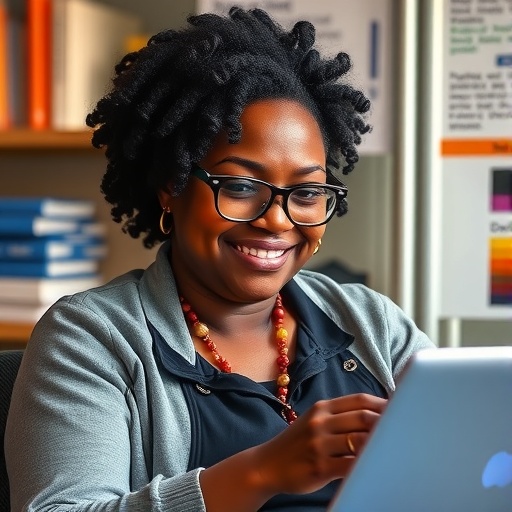Alexandria, Va. — In 2025, the employment landscape continues to evolve for Black women, reflecting broader social and economic shifts. Yet within this dynamic environment, a particularly resilient and self-determined demographic is emerging: Black women with disabilities who are increasingly embracing self-employment as a strategic and empowering career pathway. This group’s pursuit of entrepreneurial opportunities has been rigorously examined in a recent study published in the Journal of Multicultural Counseling and Development, a peer-reviewed outlet of the American Counseling Association. The research sheds light on the intersections of race, gender, disability, and economic agency, offering novel insights into how Black women with disabilities navigate and redefine their places within the labor market.
The study, entitled Breaking Barriers: The Economic Realities of Self-Employed Black Women With Disabilities, is part of a special issue that highlights the lived experiences and challenges of Black Americans with disabilities. Utilizing data gathered between August and September 2024 from the U.S. Census Bureau’s Household Pulse Survey, researchers conducted a focused analysis on feedback from 91 Black women identifying as having physical or mental health disabilities. This analytical lens provides a crucial snapshot of how disabilities influence employment choices and economic outcomes within this often marginalized cohort.
One of the most compelling findings of the research is that 43.9% of Black women with disabilities reported being self-employed—a strikingly high proportion suggesting that self-employment functions as not only a pragmatic response to barriers encountered in traditional employment sectors but also as a potent avenue for autonomy and financial self-determination. This prevalence underscores the multifaceted factors influencing employment decisions including systemic discrimination, accessibility challenges, and a desire to create flexible work environments tailored to individual needs and capacities.
Delving deeper, the study revealed the complexity within the disabilities represented: among the self-employed, 66.9% reported living with more than one mental health condition, highlighting the nuanced realities of managing intersecting health issues. Visual impairments affected 27.3%, while mobility and auditory disabilities were reported by 11.8% and 11.3% respectively. Such diversity signals the need for adaptive support mechanisms and inclusive policies that address a broad spectrum of functional limitations, ensuring equitable access to entrepreneurial resources and opportunities.
The data also reveals a significant educational and economic nuance. Black women with physical disabilities were found to be more likely than their nondisabled counterparts to hold graduate degrees, with 31% possessing advanced certifications compared to 15.5% in the nondisabled group. This educational attainment correlates with increased financial earnings, as 55.4% of women with physical disabilities reported annual incomes of $50,000 or more, surpassing the 33.7% reported in the nondisabled population. These findings complicate traditional stereotypes about disability and socioeconomic disadvantage, illustrating a resilience and resourcefulness that challenges prevailing narratives.
Gemarco Peterson, PhD, assistant professor of clinical rehabilitation counseling at Georgia State University and lead author of the study, emphasizes the importance of recognizing the agency that Black women with disabilities exercise in forging economic paths. According to Peterson, counselors play a pivotal role in acknowledging the aspirations of their clients for meaningful participation in the labor market. By validating self-employment as a legitimate and viable career option, professionals can better support career development strategies that respect and integrate the complex identities of their clients.
Moreover, Peterson draws attention to the critical role vocational engagement plays in mental and emotional well-being. The research asserts that vocation is a key social determinant of health, intertwining with psychological outcomes in profound ways. Systemic barriers—whether rooted in ableism, racism, or sexism—often restrict employment opportunities and thereby detrimentally affect the overall health of Black women with disabilities. As such, a siloed approach that isolates employment from health and wellness considerations risks overlooking the holistic needs of these individuals.
The study advocates for enhanced training within counselor education programs to equip professionals with the skills to identify and counteract the harmful stereotypes and inaccurate narratives that perpetuate stigma against Black women with disabilities. Such educational improvements would foster culturally competent approaches that champion empowerment and dignity, creating more supportive environments where clients’ intersecting identities are not obstacles but sources of strength.
A further implication of the research is the necessity for systemic change that dismantles entrenched barriers inhibiting economic participation. This involves not only expanding access to capital, mentorship, and business development resources but also addressing policy-level constraints that disproportionately disadvantage disabled entrepreneurs of color. A comprehensive framework that integrates social justice, economic empowerment, and health promotion is essential to effect enduring change.
The narrative emerging from this research is one of resilience, adaptability, and strategic self-determination among Black women with disabilities. Their increasing engagement in self-employment underscores both the limitations of traditional labor markets and the innovative responses individuals employ to circumvent these challenges. By rewriting the script on disability and entrepreneurship, these women are actively reshaping economic and social paradigms.
In conclusion, the findings presented in Breaking Barriers illuminate the vital intersections of disability, race, gender, and economic opportunity, reminding stakeholders of the urgency and complexity involved in fostering inclusive labor markets. The study not only challenges simplistic assumptions about disability and work but also calls for a holistic, intersectional approach to career counseling and policy formulation, one that thoroughly acknowledges and supports the unique lived experiences of Black women with disabilities.
For further information regarding this study and its broader implications, interested parties may contact the American Counseling Association or reach out to the media contact, Karen Addis at karen@addispr.com.
Subject of Research: People
Article Title: Breaking Barriers: The Economic Realities of Self-Employed Black Women With Disabilities
News Publication Date: August 27, 2025
Web References:
- Article link: https://ACAA.informz.net/z/cjUucD9taT05NDU5MjM0JnA9MSZ1PTk3MTY4NjA5NCZsaT04OTE2MDc0MQ/index.html
- Special issue on Black Americans with disabilities: https://ACAA.informz.net/z/cjUucD9taT05NDU5MjM0JnA9MSZ1PTk3MTY4NjA5NCZsaT04OTE2MDc0Mg/index.html
References: DOI 10.1002/jmcd.12327 (http://dx.doi.org/10.1002/jmcd.12327)
Keywords: Clinical psychology, Psychological stress, Self concept




